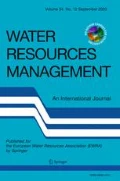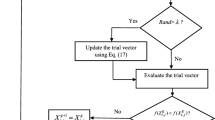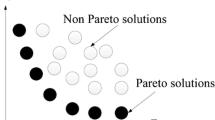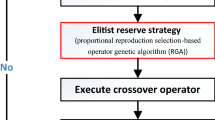Abstract
This paper develops a new method for real-time operation of reservoir systems. Genetic programming (GP) and a developed fixed length gene GP (FLGGP) are applied and compared in two approaches of static and dynamic operation rules with the aim of hydroelectric supply of Karun3 reservoir in Iran. Results are compared with those of genetic algorithm (GA) and nonlinear programming (NLP) method, indicating that GP and FLGGP have a higher efficiency (on average, 5 %) than GA and NLP operation methods. In addition, results showed that the FLGGP method is a powerful and efficient tool without the limitations of GP and can be used as a suitable replacement to GP. Comparison of two approaches of static and dynamic operation rules demonstrated the superiority of dynamic operation rules and this approach has an average superiority of 10 % to static operation rules in all methods.






Similar content being viewed by others
References
Azamathulla HM, Ghani AA, Zakaria NA, Guven A (2009) Genetic programming to predict bridge pier scour. J Hydraul Eng 136:165–169
Banzhaf W, Nordin P, Keller R, Francone FD (1998) Genetic programming: an introduction. Morgan Kaufmann Publishers Inc., San Fransisco
Barati R, Neyshabouri SAAS, Ahmadi G (2014) Development of empirical models with high accuracy for estimation of drag coefficient of flow around a smooth sphere: an evolutionary approach. Power Technol 257:11–19
Bozorg Haddad O, Mariño MA (2011) Optimum operation of wells in coastal aquifers. proceedings of the Institution of Civil Engineers. Water Manag 164(3):135–146. doi:10.1680/wama.1000037
Bozorg Haddad O, Moradi-Jalal M, Mirmomeni M, Kholghi MKH, Mariño MA (2009) Optimal cultivation rules in multi-crop irrigation areas. Irrig Drain 58(1):38–49
Bozorg Haddad O, Mirmomeni M, Zarezadeh Mehrizi M, Mariño MA (2010a) Finding the shortest path with honey-bee mating optimization algorithm in project management problems with constrained/unconstrained resources. Comput Optim Appl 47(1):97–128
Bozorg Haddad O, Mirmomeni M, Mariño MA (2010b) Optimal design of stepped spillways using the HBMO algorithm. Civ Eng Environ Syst 27(1):81–94
Bozorg Haddad O, Moradi-Jalal M, Mariño MA (2011) Design-operation optimisation of run-of-river power plants. Proceed Institut Civil Eng: Water Manag 164(9):463–475. doi:10.1680/wama.2011.164.9.463
Chen L (2003a) Real coded genetic algorithm optimization of long term reservoir operation. J Am Water Res Assoc 39(5):1157–1165
Chen L (2003b) A study of applying genetic programming to reservoir trophic state evaluation using remote sensor data. Int J Remote Sens 24(11):2265–2275
Chen L (2003c) A study of applying macro-evolutionary genetic programming to concrete strength estimation. J Comput Civ Eng 17(4):290–294
Fallah-Mehdipour E, Bozorg Haddad O, Mariño MA (2011) MOPSO algorithm and its application in multipurpose multireservoir operations. J Hydroinf 13(4):794–811
Fallah-Mehdipour E, Bozorg Haddad O, Rezapour Tabari MM, Mariño MA (2012a) Extraction of decision alternatives in construction management projects: application and adaptation of NSGA-II and MOPSO. Expert Systs Applic 39(3):2794–2803
Fallah-Mehdipour E, Bozorg Haddad O, Mariño MA (2012b) Real-time operation of reservoir system by genetic programming. Water Resour Manag 26(14):4091–4103
Fallah-Mehdipour E, Bozorg Haddad O, Mariño MA (2013a) Developing reservoir operational decision rule by genetic programming. J Hydroinf 15(1):103–119
Fallah-Mehdipour E, Bozorg Haddad O, Mariño MA (2013b) Extraction of multicrop planning rules in a reservoir system: application of evolutionary algorithms. J Irrig Drain Eng 139(6):490–498
Fogel, L. J. (1964) “On the organization of intellect.” Ph.D. Thesis, University of California Los Angeles, Los Angeles, CA, USA
Fogel DB (1991) System identification through simulated evolution: a machine learning approach to modeling. Ginn Press, Needham Heights
Fogel LJ, Owens AJ, Walsh MJ (1966) Artificial intelligence through simulated evolutions. Wiley, Michigan
Hakimzadeh H, Nourani V, Amini AB (2013) Genetic programming simulation of dam breach hydrograph and peak outflow discharge. J Hydrol Eng. doi:10.1061/(ASCE)HE.1943-5584.0000849, Posted ahead of print May 18
Hashimoto T, Steninger JR, Loucks DP (1982) Reliability, resiliency and vulnerability criteria for water resource system performance evaluation. Water Resour Res 18(1):14–20
Izadifar Z, Elshorbagy A (2010) Prediction of hourly actual evapotranspiration using neural network, genetic programming, and statistical models. Hydrol Process 24(23):3413–3425
Karimi-Hosseini A, Bozorg Haddad O, Mariño MA (2011) Site selection of raingauges using entropy methodologies. Proceed Institut Civil Eng: Water Manag 164(7):321–333. doi:10.1680/wama.2011.164.7.321
Koza JR (1992) Genetic programming: On the programming of computers by means of natural selection. MIT Press, Cambridge
Koza JR (1994) Genetic programming II: automatic discovery of reusable programs. MIT Press, Cambridge
Orouji H, Bozorg Haddad O, Fallah-Mehdipour E, Mariño MA (2013) Estimation of Muskingum parameter by meta-heuristic algorithms. Proceed Institut Civil Eng: Water Manag 166(6):315–324. doi:10.1680/wama.11.00068
Overman E (2011) A MATLAB tutorial. Department of Mathematics. The Ohio State University, Columbus, 180 p.p
Rosenthal RE (1981) A nonlinear network flow algorithm for maximization of benefits in a hydroelectric power system. Oper Res 29(4):763–786
Seifollahi-Aghmiuni S, Bozorg Haddad O, Omid MH, Mariño MA (2011) Long-term efficiency of water networks with demand uncertainty. Proceed Institut Civil Eng: Water Manag 164(3):147–159. doi:10.1680/wama.1000039
Seifollahi-Aghmiuni S, Bozorg Haddad O, Omid MH, Mariño MA (2013) Effects of pipe roughness uncertainty on water distribution network performance during its operational period. Water Resour Manag 27(5):1581–1599
Shokri A, Bozorg Haddad O, Mariño MA (2013) Algorithm for increasing the speed of evolutionary optimization and its accuracy in multi-objective problems. Water Resour Manag 27(7):2231–2249
Sivapragasam C, Vasudevan G, Vincent P (2007) Effect of inflow forecast accuracy and operating time horizon in optimizing irrigation release. Water Resour Manag 21(6):933–945
Wardlaw R, Sharif M (1999) Evaluation of genetic algorithms for optimal reservoir system operation. J Water Resour Plan Manag 125(1):25–33
Yao X, Liu Y, Lin G (1999) Evolutionary programming made faster. IEEE Trans Evol Comput 3(2):82–102
Yeh WWG (1985) Reservoir management and operations models: a state-of-the-art review. Water Resour Res 21(12):1797–1818
Author information
Authors and Affiliations
Corresponding author
Rights and permissions
About this article
Cite this article
Akbari-Alashti, H., Bozorg Haddad, O. & Mariño, M.A. Application of Fixed Length Gene Genetic Programming (FLGGP) in Hydropower Reservoir Operation. Water Resour Manage 29, 3357–3370 (2015). https://doi.org/10.1007/s11269-015-1003-1
Received:
Accepted:
Published:
Issue Date:
DOI: https://doi.org/10.1007/s11269-015-1003-1




